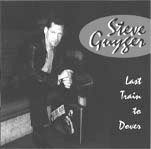|
Steve Guyger Last Train to Dover Hot Productions 33221 |

|
|
Steve Guyger Last Train to Dover Hot Productions 33221 |

|
The passing of Jimmy Rogers is certainly a significant blow to the blues world, but it’s especially saddening for harmonica players. Rogers was the last of the original "Headcutters," the seminal trio including Muddy Waters and Little Walter Jacobs that reshaped Chicago blues in 1952, a brotherhood that was the backbone of what is still considered the greatest of all that city’s blues bands. Besides helping invent Chicago’s amplified blues concept, Rogers was on the bandstand with Walter during the years when his playing was at its zenith, when the skills of the harp wizard Jacobs melded with Rogers’ near perfect accompaniment and catapulted the harmonica as the premiere solo voice in Muddy’s blues.
Rogers was also the last torch bearer of the "deep blues" attitude of that ’50s unit, where the sounds and feel of the Delta were always present, even in the most amplified environment. This is certainly one of the reasons players like Kim Wilson and others gravitated to him. But although a lot of players would come and go through both Rogers’ and Muddy’s bands over the years, only a few harp players actually shared extensive tenure with these masters, soaking up the "deep blues" lessons and learning the tradition, hand-picked because their sound fit with the amplified Delta-cum-Chicago gumbo invented over 45 years ago. A mere handful of these players are still with us — James Cotton, Carey Bell and Mojo Buford come to mind, along with Jerry Portnoy and Paul Oscher, all of whom spent time with Muddy.
But only one player worked year in and out with Rogers after his brilliant return to the blues late in his life — Steve Guyger. Guyger was with Rogers for most of 13 years (a tenure longer than any of the aforementioned served with Muddy) and yet he is probably the least-known among the aforementioned. Last Train to Dover, his second CD as a leader, should establish him as more than just a well-kept secret among fellow harp players and help gain him recognition not only as a great instrumentalist, but a conduit through which flows the lessons Rogers taught him.
Guyger, like Oscher and Portnoy, is a traditionalist in his approach to the instrument: Big tone, nuance and a devotion to his forebears are his obvious choices. Pyrotechnics, speed and flash are not. Like the music of his mentor, this CD has raw blues feeling in spades — I haven’t heard much like it for the past few years from anyone except Oscher, whose superb Knockin’ on the Devil’s Door from last year also featured Guyger in a supporting role. In fact, as good as Guyger’s last CD was — 1994’s Live at the Dinosaur, a live set much loved by harp players — this collection exhibits a range and grasp of blues styles that elevates Guyger to the upper echelon of working bluesmen.
Guyger’s presentation here is stripped down and unadorned, oftentimes rough and dirty. Although bass and drums are listed, they are greatly muted — the songs have an acoustic feel, and with each one Steve makes a great statement about the simple communicative powers of the blues. "Catfish Blues" opens and rightly focuses on the rhythmic repetitiveness of the guitar part, Guyger’s vocals mixed just below the latter. "Honeydripper" is a jaunty front-porch instrumental, "That’s Right" reminiscent of the directness of Sonny Boy #2 and "John Henry" a witty take on this classic, played with much humor on the chromatic harp. "Blues From the Darkside" is reverb drenched, a la Walter’s "Blue Midnight," full of the sadness and the loneliness of solitary late nights.
There are three other instrumentals, and each is a testament to the harpist’s amazing "feel" for his instrument as well as a joy for the listener — none are flashy, but all are infectious. "Come Back Home" and "Love Is a Gamble" are fine live-sounding cuts reminiscent of the ensemble approach of his first CD. On these cuts and throughout the entire recording the guitar work of Rich Yescalis is terrific — this is a guy who knows how to work with harp players, and his fretwork is a significant part of the success of every cut. He and Guyger share a remarkable, telepathic sympatico.
Paul Oscher claims in his liner notes that Steve Guyger is all about being "true to the spirit of the blues." At a time when the term blues can refer to jump, swing, Chicago, Texas, amplified or acoustic, it’s a treasure to find someone who has adhered to the traditions of the Delta as learned from his great teacher, Jimmy Rogers. Guyger is clearly carrying the torch onward.
— Tom Ellis III